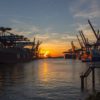I must admit that I was somewhat uneasy about the fact that I was the only one representing investors, industrial actors, and the all Europeans under the age of 55. More importantly, I think that I was the only male struck by the total absence of female representatives in the group of ten CEOs.
It is interesting to note that there is a growing interest towards the blue bio economy in the insurance sector. I also noticed that the managers have done their homework and have begun to assimilate and use all the various blue growth key words and jargon. I’m obviously not taking about the Norwegian, Swiss, or Canadian insurance companies, but rather the traditional continental one with SME networks of which no more than 1.2% are true innovative blue growth clients.
The ideas exchange were nonetheless interesting, disrupting, kind of surprising but hey…..this is what one should expect from this kind of brainstorming. At one point, the question was “what is needed to really make the blue growth an economic reality?” More investments – good! More regulation – good! Better governance – very good! Entrepreneurship – excellent! Tax breaks – why not! Better infrastructure – naturally! But more public involvement? Please, give me a break! And then my turn came:
“Gentlemen, I do appreciate this solid analysis but what we really need is leadership, vision, guts and innovative thinking. Let me explain. The blue bio economy is already a reality: in Europe the market capitalization represents 55 billion euros and 186 B$ worldwide. This blue bio economy encompasses a wide range from aquaculture, the harvesting of natural compounds, biorefinery for feed, nutrition, cosmetics, pharmaceuticals and bio-materials, bio-plastics, and environmentals. We have already broken down the existing silos to work in a very trans-sector approach.
To lead this sustainable economic crusade, I have my two champions. The first one is HSH prince Albert II of Monaco. From the very start he was on-board, calling for action, inviting industry, investors and applied research to increase collaboration to improve ocean sustainability. He is not facing any election and has his own agenda independent from lobbies. He understands better than anybody else how the scientific progress and sustainable aquaculture could help to improve the day to day lives of many people across the world, solve the protein issue that the world is facing, bring more renewable energy, and heal the worst diseases that global warming is spreading around the world. We also have a new champion by the name of Marcelo Rebelo de Sousa and I like him very much. He is the new President of the bluest european nation: Portugal. I had the chance to meet with him shortly after his election. It did not take long for him to embrace the cause. He really understands the economics, the media importance and the enormous amount of work that is still required to educate the world population on the great opportunities that will be created by bleu growth.
In the coming months, our champions list will grow as more civil society representatives, economic leaders, key scientists continue to rally to the cause of the blue growth. So far, countries and regions such as Norway, Ireland, Portugal, Scotland, Japan, China, Canada and Quebec have published their blue vision and I am happy to report that we are establishing stronger economic links between them through our BICA association to foster business opportunities. What is need now is a global blue vision. Not the top down standard approach, the one that comes from the clusters, from the regions, from the states and the countries which have already understood that the blue economy will revive their economy. This vision should take into account the best methods that we can apply improve cluster to cluster cooperation, inter-regions collaboration, and country to country synergies based on sea basin approaches. The Mediterranean, the North Atlantic, the Baltic, the Artic etc…sharing best practices, giving the lead to the young generation, assisting them with proper funding, supporting them with a flexible and tailor made regulation, destroy bottlenecks that hinder collaborative research and transnational exchanges. Yes this vision already exists but in most countries blue growth is not even on the agenda.
Allow me to make a small detour just to explain how DG Mare and DG research are playing an important role for this international cooperation. They reach far beyond the borders of Europe to attract innovation and set up the best innovation cooperation for the blue growth. These guys deserve our respect for the excellent job they have been doing.
Guts, this is the job for our young generation. They are our future and they are good. They deserve a better representation in our global governance but my generation has some issues to let go. For my fellow babyboomers, I just want to say: let go and start handing over your positions to the next generation, they will do much better than us! Time to act. Let us build a new sustainable booming blue economy. Come help us to make this bottom up approach the reference for our blue growth.”
There was a huge silence after I finished my speech… this is where I lost them.
Time to shift minds. Join the blue growth community become a BioMarine activist in order to create jobs and blue value…..












